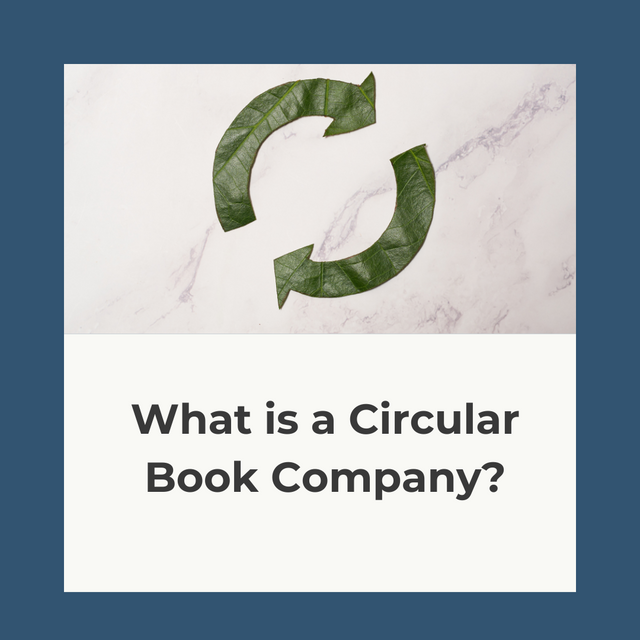What is a Circular Book Company?
Understanding a Circular Book Company and Its Lasting Benefits to the Publishing Economy
In today's world, sustainability and resource conservation are more important than ever. Enter the circular book company, a transformative concept in the publishing industry that emphasizes the repair, redistribution, and upcycling of books. This innovative approach not only extends the life of printed and published materials but also offers significant benefits to the publishing economy. In this article, we will delve into what a circular book company is and explore the myriad ways it positively impacts the publishing landscape.
Introduction
The traditional linear economy in publishing often leads to vast amounts of waste, with damaged or unsold books frequently ending up in landfills. However, the circular book company is changing this narrative. By focusing on repairing damaged books, redistributing those in good condition, and upcycling materials into new products, these companies are fostering a more sustainable and economically viable future for the publishing industry.
The Concept of a Circular Book Company
What is a Circular Book Company?
A circular book company operates on the principles of a circular economy, where the lifecycle of products is extended through reuse, repair, and recycling. Specifically, these companies take broken and damaged books, repair them for future use, and redistribute books in good condition to students and book-lovers via online platforms or brick-and-mortar stores. Additionally, they establish processes for upcycling books into new goods and paper products, ensuring that no book goes to waste.
The Repair and Redistribution Process
Circular book companies put significant effort into repairing damaged books. Skilled technicians carefully restore these books, fixing bindings, replacing covers, and ensuring that pages are intact. Once repaired, these books are made available for resale, effectively giving them a second life. Books in good condition are redirected straight back into circulation, reaching new readers.
Upcycling Books into New Products
Beyond repair and redistribution, circular book companies are pioneers in upcycling. This process involves transforming old books into new paper products and goods such as stationery, art, or even recycled paper. By creatively repurposing book materials, these companies contribute to reducing waste and promoting environmental stewardship.
The Environmental Impact
Reducing Waste
One of the most significant benefits of circular book companies is the substantial reduction in waste. By repairing and redistributing books, these companies prevent countless volumes from ending up in landfills. This not only conserves resources but also minimizes the environmental footprint of the publishing industry.
Conserving Resources
Repairing and upcycling books help conserve the raw materials needed for producing new books. Paper production is resource-intensive, requiring large amounts of water and energy. Circular book companies reduce the demand for new paper by reintroducing existing books into the market and creating new products from recycled materials.
Promoting Sustainable Practices
Circular book companies set a precedent for sustainable practices within the publishing industry. By prioritizing the reuse and recycling of materials, they encourage other companies and consumers to adopt environmentally friendly habits. This cultural shift towards stewardship can have far-reaching positive effects.
Economic Benefits
Creating Jobs and Supporting Local Economies
The operations of circular book companies generate employment opportunities, particularly in areas such as book repair, logistics, and retail. By supporting local economies through job creation and partnerships with local businesses, these companies contribute to economic growth and stability.
Offering Affordable Books
By making repaired and upcycled books available at lower prices, circular book companies increase access to affordablity. This is especially beneficial for students and communities who might otherwise struggle to afford new textbooks. Increased accessibility supports education and fosters a love for reading across diverse communities.
Encouraging a Thriving Second-Hand Market
Circular book companies stimulate the second-hand book market, which is an integral part of the publishing economy. By maintaining the quality and availability of second-hand books, these companies ensure that more people can enjoy reading and learning without the need for constant production of new textbooks.
Social and Cultural Impact
Promoting Literacy and Education
Access to affordable textbooks through circular book companies enhances literacy and education. By providing students with the resources they need, these companies support academic success and lifelong learning. The cultural importance of books as sources of knowledge and inspiration cannot be overstated.
Fostering a Love for Books
Circular book companies play a crucial role in fostering a love for learning, reading and knowledge. By making a wide range of literature and textbooks accessible, they help cultivate a reading culture that values and cherishes books. This cultural shift can lead to a more informed and engaged society where no book is wasted.
Encouraging Community Engagement
Through initiatives such as book donation drives and community events, circular book companies engage with local communities. These activities not only promote the company's mission but also encourage community members to participate in sustainable practices and support their local economy including schools and libraries.
Conclusion
In summary, a circular book company represents a forward-thinking approach to sustainability in the publishing industry. By repairing, redistributing, and upcycling books, these companies offer lasting benefits to the publishing economy, the environment, and society at large. As we move towards a more sustainable future, the role of circular book companies will undoubtedly become increasingly important, paving the way for a greener and more equitable world.

